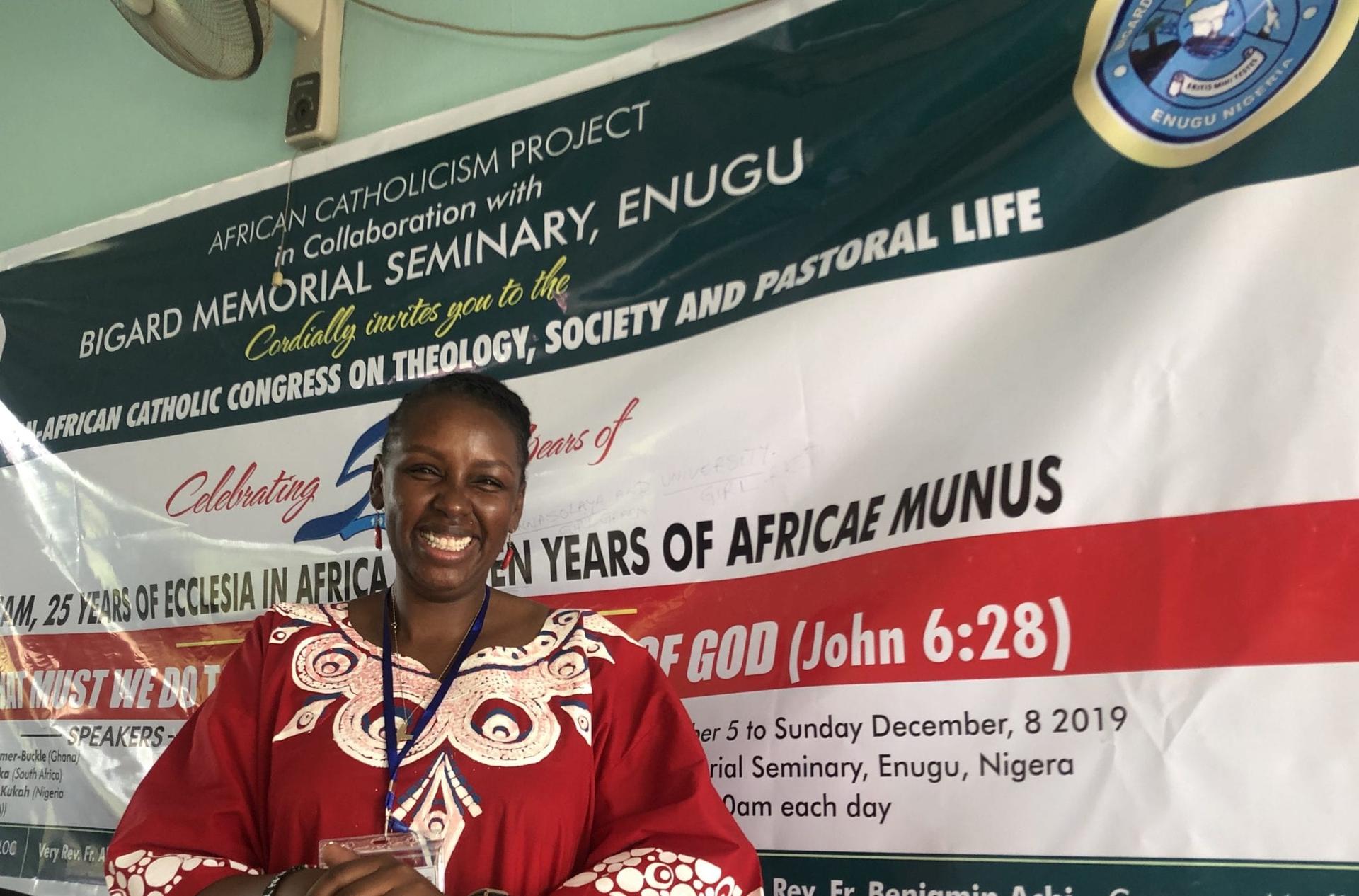ENUGU, Nigeria — As the number of African Catholics continues to soar, one Kenyan nun is warning that they must first “clean house” when it comes to the issue of clergy sexual abuse before exhibiting greater leadership in the global Church.
“The African Church is said to be the fastest growing Catholic demographic and is expected to reach 350 million by the year 2050,” said Sister Mumbi Kigutha during the Pan-African Conference on Theology, Society, and Pastoral Life taking place this week at Bigard Memorial Seminary.
RELATED: Pan-African summit opens with pleas for justice for Africa and its people
“The implication of such growth is already being felt all over the global Church, as we see the changing skin hues in those filling the pews and also serving in ministerial positions.”
“We need to clean house, so to speak, before we take up a place of leadership in our evolving and beloved church,” she cautioned in a lacerating talk to international delegates of professors, priests, and seminarians.
“We are wounded, the body of Christ is ailing, clergy and laity alike, perpetrator, victim or both, we are all in dire need of healing,” she said on Friday, noting that while clerical abuse is often focused on the issue of the abuse of minors, the abuse of nuns at the hands of priest has gone largely unexposed.
While the global clergy abuse crisis has dominated headlines over the past year, Kigutha recalled that in 1994, a Medical Missionary of Mary, Sister Maura O’Donoghue, filed a report on the abuse of nuns that went ignored by the Vatican.
Twenty-five years later, the Vatican finally held a worldwide abuse summit in Rome where Nigerian Sister Veronica Openibo told representatives from every bishops’ conference around the world that abuse was not just a western problem, but a global one. That same month, during an in-flight press conference, Pope Francis himself would acknowledge the abuse of nuns by priests, and he said the Church must do more to prevent it.
During her address, Kigutha identified three major contributions to the root cause of abuse and its reoccurrence in the Church: power and boundary issues, a culture of secrecy and dominance, and cultural norms and gender roles.
The authority granted to priests, she argued, often blurs boundaries with other religious, especially “when the other person happens to be an adult nun who quote unquote is part of the establishment.”
She said that the power is often lorded over such individuals, especially through their control of finances, real estate, cars, and ecclesial connections.
In calling out the secrecy within the Church, she said that the institution is often self-referential, preferring to protect itself at the expense of victims.
“Such situations allow abusers to thrive, much like in domestic violence situations, where we ask victims to forgive and keep the matter within the family… Abusers are well aware of these realities, they know all will be well, when they use their power to harm others,” she said.
As for gender, Kigutha said “the Church reinforces gender roles, positioning women as being available for men, further enforced by the many roles that nuns play in facilitating priestly work.”
To further punctuate her point, she noted that at the two most recent Synods in Rome, religious brothers were invited to participate and vote, but that function was not extended to the women who were present.
“If the reason for exclusion prior had been the sacrament of Holy Orders, what is it this time? The only remaining difference that is then discernible is purely biological and anatomical,” she said.
Looking ahead, Kigutha, who is a member of the congregation of the Sisters of the Precious Blood, used her remarks to urge the Church to embrace a model of restorative justice when it comes to abuse so that both the victims and perpetrators may receive healing and justice.
“A restorative model of justice does not negate that there should be consequences for one’s actions, however that justice is always tempered with truth, mercy and love, for all have indeed sinned and fallen short of the glory of God,” she said.
“Restorative justice seeks to bring back all to right relationship with God, self and others. Charity and social justice begins at home and we need to establish better ways of helping our sisters and brothers, of course starting with victims of sexual abuse but also reaching out to perpetrators,” she continued, noting that abuse is often further perpetrated by victims of abuse and that the Church cannot neglect either party.
Personal trauma begets institutional trauma, she argued, adding that this self-woundedness must be acknowledged so that the cycle of abuse is not continued.
Speaking to a majority African audience, Kigutha drew on two African concepts — Sankofa, which is a symbol of learning from the past, and ubuntu, which means compassion and humanity — that she said would be useful for the global Church in charting a way forward through one of the most painful and divisive issues for Catholics around the world.
“It is in community that we are born, formed and thrive and it is in community — an all-inclusive church, where everyone is given a seat and voice — that we shall heal and be reconciled and restored to a right relationship with God, self and one another,” she concluded.
Following her address, Kigutha was flocked by a group of seminarians seeking to have their picture taken with her.
The nun obliged, but warned them: “You’ve heard my talk, so now you’re accountable to me. I better not hear any stories of you mistreating anyone!”
Follow Christopher White on Twitter: @cwwhite212
Crux is dedicated to smart, wired and independent reporting on the Vatican and worldwide Catholic Church. That kind of reporting doesn’t come cheap, and we need your support. You can help Crux by giving a small amount monthly, or with a onetime gift. Please remember, Crux is a for-profit organization, so contributions are not tax-deductible.












